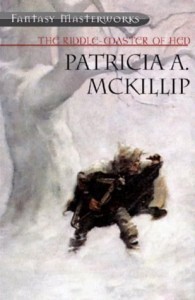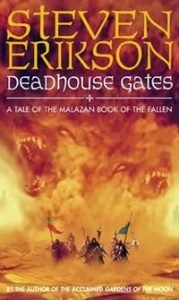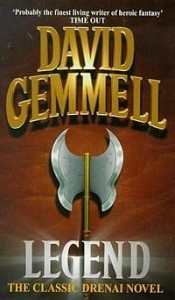Six Great Heroes of Epic Fantasy: Part 1
You may recall that my earlier posts on "Six Great Heroines", here and here drew on the whole of SFF, but when I put together my list of "Six Great Heroes" they were all drawn from the epic fantasy subgenre. And, in fact, may yet have to be a magnificent "Seven"—but I shall "wait and see" on that one.
Once again, I am restricting my list to heroes drawn from books, rather than film or television, even though films of tv series may subsequently have been based on some of the stories. (So no, sorry: no Captain Malcolm Reynolds, or anyone at all from Buffy, Battlestar Galactica, or Babylon Five! And yes, I know, they're definitely not epic fantasy, but once The Lord of the Rings films are deducted, the list of potential film/tv candidates in that subgenre grows very thin …)
So here we go, Six Great Heroes of Epic Fantasy, Part the First—and as for the heroines—in alphabetical order.
.
 A is for Astrin Ymris, poet, prince, and at need warleader, of Patricia McKillip's The Riddlemaster of Hed trilogy (commencing with the book of the same name.)
A is for Astrin Ymris, poet, prince, and at need warleader, of Patricia McKillip's The Riddlemaster of Hed trilogy (commencing with the book of the same name.)
So why choose Astrin, when he is i) neither the principal or secondary male protagonist of the Riddlemaster tale; and ii) in fact I really like both the two central characters: Morgon, the Riddlemaster, and the minstrel, Deth. By way of answer, The Riddlemaster of Hed has long been one of my favourite Fantasy trilogies and Astrin Ymris was one of the early characters whom I felt epitomized the combination of mysteriousness, magic, and myth that characterized the books.
When we first meet Astrin he is living in exile on a remote moor, digging up shards of the past in an attempt to understand it. Half archaeologist, half wizard, he is in exile for holding to a difficult truth, even though it has estranged him from the brother he loves. He goes on to lose an eye in the conflict that follows the arrival of Morgon and eventually—because of his loyalty to his brother—takes on the role of general of the Ymris armies, at which he excels—although like Cincinnatus, that is neither his preference nor his calling.
I have read a great many fantasy and epic fantasy stories since I first opened The Riddlemaster of Hed, but Astrin Ymris continues to stand out as a character who is original (poet, prince, archaeologist, half wizard, warrior), intelligent, and interesting. No cardboard cutout material here—and a major reason for leading with Astrin is because I believe that the presence of compelling second characters is one of the vital ingredients that really give a book depth.
—
 C is for Coltaine, nomad horseman and a general of the Malazan empire in Steven Erikson's Deadhouse Gates, the second of the Malazan Book of the Fallen series.
C is for Coltaine, nomad horseman and a general of the Malazan empire in Steven Erikson's Deadhouse Gates, the second of the Malazan Book of the Fallen series.
Several people have said to me: "when you do the six heroes post you have to include Coltaine. He is so cool." And they are quite right: Coltaine is cool. He is also much more of an archetype than Astrin: i.e. the "barbarian" outsider, regarded with suspicion by many, his loyalty to the empire doubted even though he holds the rank of Fist (general). Yet through his leadership, courage, and sacrifice, Coltaine puts to shame those who fear and doubt him.
In brief, Coltaine is commanded to retreat from a territory that the empire cannot currently hold, including evacuation of the civilian population. The easy option would be to abandon the civilians, but Coltaine doesn't do that. Instead he holds the fighting retreat together in what becomes known as the "Chain of Dogs", a 'great march' in the face of constant privation and hardship as well as battle.
Coltaine is courageous and astute, a strategist and leader—and could so easily be a heroic cutout. But he isn't. The thing about Coltaine is that he is real: you can smell the metal and leather of his armor, and the sweat and dirt. He is human, neither invulnerable nor infallible, but able and determined. So yeah, "C" is definitely for "cool"—it's also for "compelling" and a "character you care about." 'Nuff said, I reckon.
—
 D is for Druss, the legendary axeman of David Gemmell's Legend, the first published, although not the first chronologically of his Drenai novels. (I "think" the first chronologically would be Waylander.)
D is for Druss, the legendary axeman of David Gemmell's Legend, the first published, although not the first chronologically of his Drenai novels. (I "think" the first chronologically would be Waylander.)
On June 13, in my initial post on this year's Gemmell Awards, I mentioned that "I am a long time fan of David Gemmell, particularly his early novels such as Legend, Waylander and The King Beyond the Gate … [and that] … it would be fair to say that David Gemmell was a huge influence on my own love of epic fantasy."
So perhaps my view is coloured by my fandom, but in terms of six great heroes of epic fantasy, I really don't see how I could pass by Druss the Legend. At first glance he is another archetype, the legendary axeman holding together a forlorn hope against overwhelming odds. So why do I see Druss as a standout character? Firstly, and most unusually for a central protagonist, Druss is old. Arthritic, in fact, and definitely slower moving of a morning. Also, he is not a prince, or a knight, or any kind of "chosen one": Druss is of the common people, originally a yeoman farmer before fate intervened.
The central story is also classic epic fare: the desperate Drenai defence against a besieging horde, with Druss playing a pivotal part in that. Here's the thing, though: what makes Druss interesting as a character is that his central conflict is not against the Nadir horde, but with encroaching age and death, and also with the dichotomy between reality and his own legend. Gemmell's great achievement with this character, in my humble opinion, is that to those around him he is Druss the Legend while we, as readers, know him as Druss the man—yet remain convinced by the legend.
—
So there you have it, the first three of my "Six Great Heroes of Epic Fantasy." I shall return tomorrow, the tutelaries of the blogosphere allowing, with the final three—or will it be four? Stay posted! In the meantime, who else would you put on the list? Who, in your opinion, cannot be left off? And why do you hold that view?



